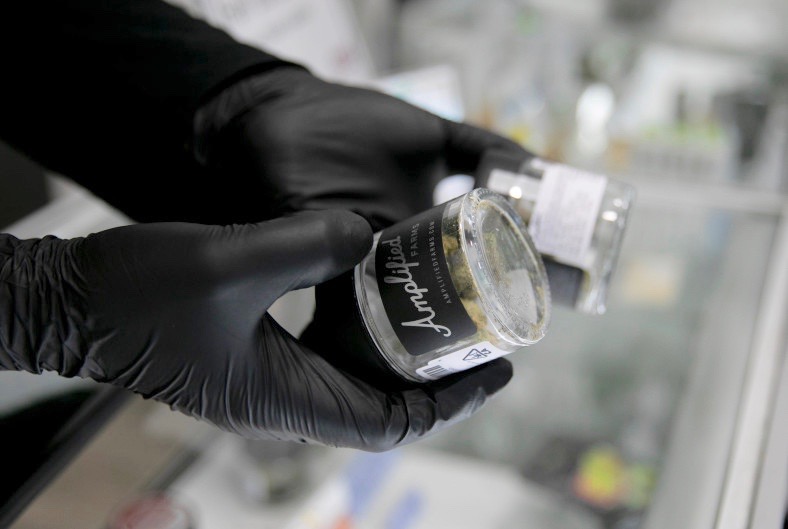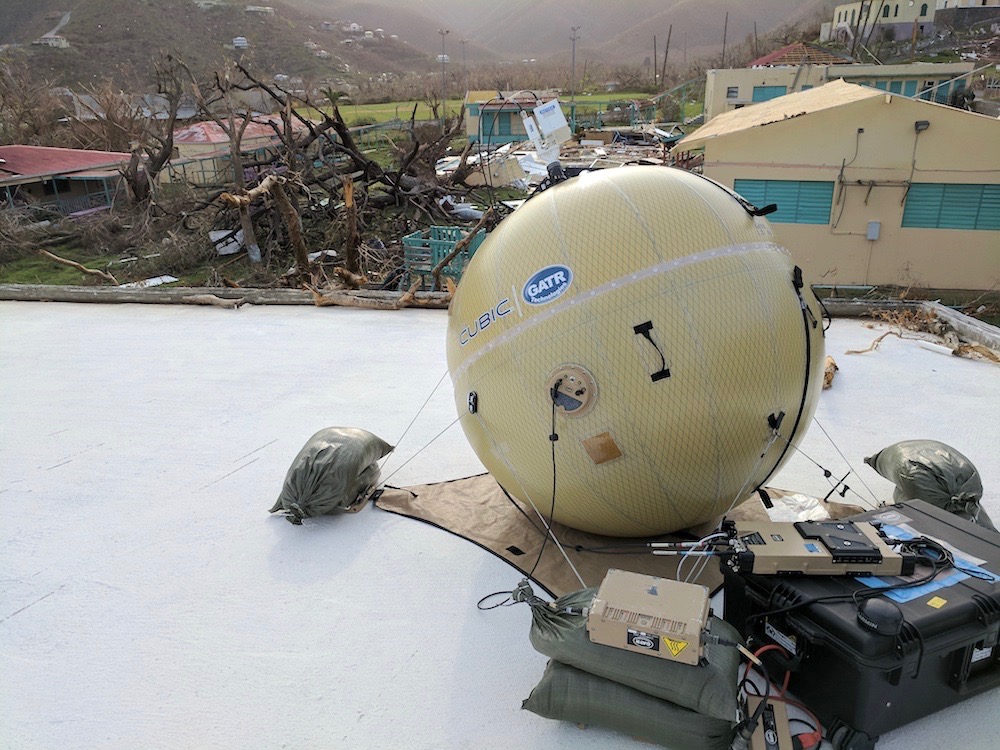Daily Business Report-March 26, 2020
Jars of marijuana at a Berkeley dispensary on March 21. (Photo by Anne Wernikoff for CalMatters)
Cannabis and cocktails amid coronavirus?
State says carry on
by Ben Christopher | CalMatters
There may be a coronavirus pandemic, but California is making it easier than ever for housebound and anxious residents to get buzzed.
In a series of new orders and regulations, state authorities have eased restrictions on cannabis dispensaries and on restaurants in the booze business to help them weather the financial impact of shelter-in-place orders. Pot shops in particular have been classified as essential, allowed to remain open during the shutdown, having made the cut alongside rural health clinics, hospice workers and blood banks.
State regulators want to ensure that social-distancing orders are followed while keeping some especially vulnerable businesses from collapsing during what is likely to be the worst economic crisis at least since the Great Recession. An additional concern: that cooped up and panicked Californians may be particularly prone to substance abuse during the crisis.
Gov. Gavin Newsom, who as lieutenant governor campaigned for legalization, and other state authorities have sunk significant political capital into seeing that California’s experiment with cannabis legitimacy doesn’t fail. The pandemic is likely to buffet an industry that those in the business say was already struggling under restrictive conditions, high taxes and a still-ubiquitous black market.
Since the beginning of the public health emergency, pot shops have been granted waivers allowing customers to purchase weed from their cars or to have the product brought to their homes without a signature (which is ordinarily required), thus keeping customer and delivery person appropriately apart. Instead, customers can text a photo of their identification to the dispensary.
Pamela Epstein, general counsel for Eden Enterprises, which operates a dispensary in unincorporated Alameda County, said she applied for a waiver to allow customers to call ahead and pick up an order without entering the shop.
“I submitted the application over a weekend and had it by the end of the day Monday,” she said.
She said she appreciated the governor’s classification of her industry as essential. “If you were to cut off legal, safe, compliant access right now, you would be driving consumers to illegal access,” she said.
At first glance, cannabis vendors wouldn’t seem to be in any trouble. Outlets across the state have reported long lines outside dispensaries as coronavirus concerns have ramped up.
Epstein said her sales have been up 150% across the board — a surge in both customers and the size of each purchase.
But such increases may be a temporary bump, said Jerred Kiloh, president of the United Cannabis Business Association. He’s also the owner of The Higher Path dispensary in Sherman Oaks, where sales are now conducted through car windows, with money and product passed in a basket.
“People stockpiled just like they did toilet paper,” he said. On the day when Los Angeles Mayor Eric Garcetti declared a shelter-in-place order, Kiloh said he saw a 400 percent increase in sales — his biggest sales day ever. But after cannabis was declared an essential business Friday, customers no longer felt compelled to stock up, he said. On Sunday, he had his slowest sales day ever.
“We’re in a roller coaster,” he said.
And despite the recent surge in demand, the state’s cannabis industry is particularly ill equipped to survive a prolonged economic downturn, said Josh Drayton, spokesperson for the California Cannabis Industry Association. While other small businesses are turning to federal disaster loans or other emergency credit, cannabis is still illegal under federal law.
“We don’t expect any of the (federal) relief that is being made available to businesses to apply to the cannabis industry in California, so any relief we’re seeking is going to have to come from the state,” he said.
Alex Traverso, spokesperson for the state’s Bureau of Cannabis Control, said by email that the easing of regulations is not an across-the-board policy; each application is being considered on a case-by-case basis. But “in light of the current circumstances, we are trying to be as flexible as possible with businesses.”
Regulatory flexibility is also being extended to restaurants, which are now allowed to operate only as takeout and delivery operations.
Last weekend, California liquor regulators gave restaurants the go-ahead to sell beer, wine, mixed drinks and pure spirits to go, as long as they’re purchased alongside food and sold in a sealed container. The state is also allowing restaurateurs to sell entire bottles of liquor, as long as they are unopened.
More than 50,000 restaurants, brew pubs and other vendors that pair food and booze have state liquor licenses, said John Carr, spokesperson for the California Department of Alcoholic Beverage Control.
“Much of the temporary relief we are providing is to help restaurants and others in the alcoholic-beverage industry weather this crisis,” he said. “After consulting with the industry, we determined this is a way for them to continue to attract customers, keep their businesses going and keep people employed, while still emphasizing public safety.”
Alcohol is often a cash cow for restaurants, with high markups for owners and big tips for waitstaff.
Jot Condie, president of the California Restaurant Association, welcomed the regulatory change but said it wasn’t likely to make a dramatic difference for most businesses. Alcohol sales often drive up the average size of a bill not solely because of higher markups, but also because buzzed customers will stick around to socialize and eat and drink more.
“When you’re getting it delivered and maybe somebody’s ordering a pint of beer, that’s not the same as five people sitting around having two pints each,” he said. “It’s not going to drive up the (average check size) drastically. But every penny counts.”
Cole Pickett, a manager and bartender at Hollister Brewing Company, a brewpub in Goleta, near Santa Barbara, said the change of policy has been a hit with some customers.
“For them it’s like being in Vegas, like, ‘Let’s get a margarita to go!’ ” he said. “People are kind of amused by it.”
____________________________
March and Ash hourly employees to
receive a $2 per hour wage increase
March and Ash, a cannabis retailer with licensed medical and recreational operations in the cities of San Diego, Imperial and Vista, said its hourly employees will receive a wage increase of $2 per hour for the next four weeks in recognition of their work “to protect the health and safety of our workforce and our customers.”
March and Ash has more than 170 employees. Those affected include all functions including but not limited to reception, concierge, fulfillment, inventory, dispatch, customer service, marketing, and delivery. The wage increase is effective March 16.
“Our commitment to customer service is rooted in our commitment to our employees and earning their trust,” March and Ash Chief Operating Officer Jonathan Saco said. “Our employees are working under unprecedented conditions and I’m proud of the way they’ve responded to the challenge of continuing to responsibly serve the communities of San Diego and Imperial counties.”
____________________________

Aztec multi-use stadium in Mission Valley
gets key approval from CSU Board of Trustees
The California State University Board of Trustees has approved the design and financing plan for San Diego State University’s new multi-use stadium in Mission Valley. The board’s approval enables SDSU to continue preparation for the 35,000-capacity Aztec Stadium, which will be among the first projects to be constructed as part of the SDSU Mission Valley campus.
SDSU and the CSU will continue to assess the ongoing impacts of current events and make adjustments to the schedule and planning as needed.
The multi-use stadium, estimated to cost $310 million, will be funded through philanthropic gifts as well as system-wide revenue bonds that will be paid back with revenue generated by the facility including ticket revenue, naming rights and concessions. Operating costs will also be supported by revenue generated by the facility (e.g., ticket revenue, facilities rental revenue, naming rights, sponsorships, donations).
The project is part of the larger SDSU Mission Valley Campus Master Plan which was approved by the Board of Trustees in January. SDSU Mission Valley will provide SDSU with the space to grow enrollment, expand research and innovation programs, and add much needed housing for students, faculty, staff, and the general community, including affordable housing. Finally, the plan creates a long-awaited regional community River Park.
____________________________
San Diego Angel Conference to go virtual
University of San Diego event to award entrepreneurs $320,000+ in funding
COVID-19 has disrupted everything including our economy but the San Diego Angel Conference will go forward this Saturday, March 28, albeit in virtual form.
“We know a thing or two about being an innovative disruptor ourselves and we remain determined to power innovation and economic growth for our region,” said Mysty Rusk, director of The Brink Small Business Development Center at the University of San Diego.
Entrepreneurs advancing solutions for agriculture, medicine, environment and property management will compete for more than $320,000 in funding as the event takes place online from 9:45 to 1 p.m., West Coast time.
Members of the innovation community can connect to the second annual Angel Conference and interact with investors and other entrepreneurs in in Southern California and across the nation from the comfort of their home. There will be a chat room for networking and investors will use Zoom to make their decisions.
The six finalists are Agtools,, GroGuru, LifeVoxel.AI, Noria Water Technologies, SmartProperty, and Visicell Medical .
For more information and registration go to https://www.theSDangels.com.
____________________________
Citadel Defense supports production of up to
50 systems a month as drone attacks escalate
Citadel Defense says it is experiencing rapid growth after being awarded several significant Defense Department and Homeland Security contracts for its C-UAS (counter unmanned aircraft systems) products.. The growth, it said, is a direct result of delivering reliable and effective force protection against individual drones and swarms for military, government, and international customers over the past two years.
To address the surge in global demand for Titan systems, Citadel has expanded their manufacturing capabilities in San Diego to support production of up to 50 Titan systems a month. The company uses U.S. suppliers with over 70 percent of components being sourced locally in Southern California in order to improve responsiveness when executing on urgent customer requests.
Titan C-UAS systems are deployed globally, protecting combat forces, civilians, and critical infrastructure. As radio frequency-based solutions become an important requirement for layered C-UAS solutions, Citadel has had their capabilities extensively evaluated by U.S. Army, Navy, Air Force, SOCOM, and DHS Test & Evaluation teams.
Malicious drone activity, ranging from single-use hostile small unmanned aerial systems to drone swarms continue to threaten safety and national security, the company said. Over the past 18 months alone, it said, Citadel has received orders for over $17.5 million in products and services to support anti-drone initiatives around the world.
____________________________
Scripps Research urges public to join app-based
study to flag onset of viral illnesses
The Scripps Research Translational Institute has launched an app-based research program that will analyze participants’ wearable health data—including heart rates, sleep and activity levels—to more quickly detect the emergence of influenza, coronavirus and other fast-spreading viral illnesses.
Members of the public who are 18 or older and use a smartwatch or activity tracker, such as a Fitbit, Apple Watch, Amazfit or Garmin Watch, can join the study and consent to share their data by downloading the MyDataHelps mobile app.
By harnessing key data points from these users’ wearable devices, scientists believe they can improve real-time surveillance of contagious respiratory illnesses. Early detection is critical for effective public health response to infectious disease outbreaks and for improving treatments.
“In light of the ongoing flu season and the global pandemic of COVID-19, we see enormous opportunity to enhance disease tracking for improved population health,” says
Jennifer Radin, an epidemiologist at the Scripps Research Translational Institute who is leading the study. “One way to do this is to leverage and analyze the rich health data that’s already being collected by the millions of Americans who regularly use wearable devices.”




